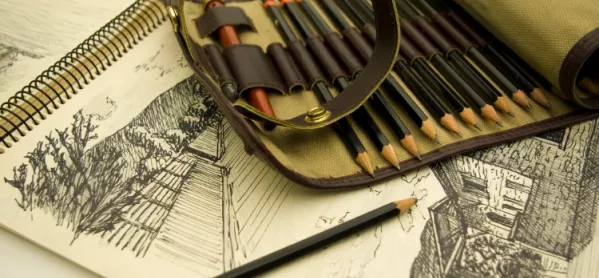With creative subjects being missed off the English Baccalaureate’s five pillars, a decrease in numbers taking art and design GCSEs and the subsequent knock on to A-level numbers, many in the world of art education have highlighted what a loss this is. The most common argument is to focus on the importance of the creative industries to the British economy.
I must admit this has been my opening for the defence for some time. This is in no small part because data can be used to back up the argument, making it easier to compare and translate to other subjects and sectors, giving the impression of a solid, hard-to-challenge viewpoint.
So why do I now think we need to shift focus away from this education-to-employment argument and view what we offer in a different light?
A distorted picture
If we base our argument solely on what jobs our students could aim for, we are presenting creative subjects in terms of career prospects alone. While the arts add much to the national purse, it is also true that most art graduates’ starting salaries are lower than those of their peers. This means that anyone choosing subjects based purely on career projections, and who does a little research, will soon discover that the arts are unlikely to lead them to the financial highlife.
It also completely misses the point of the many benefits of a creative education, which at school and college level is part of a wide variety of subjects, all complementing each other.
Let’s change the argument not to one of monetary benefit but one of societal benefit.
In their book Cartographies of the Absolute, Alberto Toscano and Jeff Kinkle present the idea of creatives using their work to map experiences and cultural and personal positions. Art allows us the opportunity to view other experiences and to lay out our own. As we engage with art (visual, written or performance) we can learn to recognise and interpret viewpoints being expressed, and then agree or disagree with the ideas presented.
This mapping of experiences allows us to place ourselves in situations far from our own and to consider our position and response. Within the history of British art, works by war artists such as Paul Nash and Henry Moore, as well as more recent photojournalism, are perhaps some of the most memorable and moving examples. Pieces like these can and have led to shifts in government rhetoric and policy because of the influential nature of the work.
Unique opportunity
Now consider the student picking their subjects in Year 9 or Year 11. Imagine telling them there is a subject that allows them to choose what experiences are relevant to them and offers them the space to explore these issues. Some of the most exciting, interesting and moving work that I have had the pleasure of seeing has come from students considering what they want to know about and exploring that.
From family projects to those relating to illness, memories or future fears, these projects give the students space in the timetable to hollow out their own line of enquiry alongside learning objectives, a tutor-supported structure and critical and historical understanding. I cannot think of a more exciting prospect.
We must remember that as well as offering a subject that could lead our young people into exciting employment opportunities, we have a subject that can empower them, free them from prescribed content by placing responsibility of focus on to them, embed the value for research and considered opinion-making and the discipline of careful refining of work. These skills are a list for any subject to be proud of and are all things we should be quick and clear to communicate.
Hannah Day is head of Visual Arts, Media and Film. Ludlow College
Want to keep up with the latest education news and opinion? Follow TES on Twitter and like TES on Facebook



